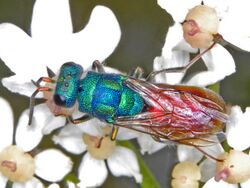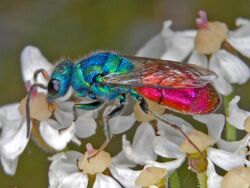Biology:Chrysura simplex
| Chrysura simplex | |
|---|---|

| |
| Chrysura simplex ampliata. Dorsal view | |

| |
| Side view | |
| Scientific classification | |
| Domain: | Eukaryota |
| Kingdom: | Animalia |
| Phylum: | Arthropoda |
| Class: | Insecta |
| Order: | Hymenoptera |
| Family: | Chrysididae |
| Genus: | Chrysura |
| Species: | C. simplex
|
| Binomial name | |
| Chrysura simplex (Dahlbom, 1854)
| |
| Synonyms | |
| |
Chrysura simplex is a species of cuckoo wasps, insects in the family Chrysididae.[1]
Subspecies
Subspecies include:[2]
- Chrysura simplex simplex (Dahlbom, 1854)
- Chrysura simplex ampliata (Linsenmaier, 1968)[3]
Distribution
This species is present in part of Europe (Albania, Austria, France , Italy, Greece, Czech Republic, Hungary, Poland , Slovakia, Spain, Switzerland and Ukraine ) and in North Africa (Algeria, Libya, Morocco, Tunisia).[1][4][5]
Habitat
These cuckoo wasps mainly inhabit grassy cliffs and sunny slopes. They can be found on plants of Euphorbia, Sedum, Daucus carota and Crepis hieracioides.[1]
Description
Chrysura simplex can reach a length of about 7–9.5 millimetres (0.28–0.37 in).[5] These wasps have a stout body with a gray pubescence. The head is metallic blue-green, nearly square, rather big, closely punctulate, with a flat face and short antennae. Also the thorax is densely dotted, with blach hairs and a basically shining blue-green coloration. Mesonotum is shining blue. The abdomen is robust. almost oval, densely punctate and silky-shiny, with red to purple-red coloration, without black patches. The wings are pale brown and hyaline. In males the red colouration is more intense.[5]
Biology
Chrysura simplex is a univoltine species.[5] Adults fly from mid-June until mid-July.[5] They especially feed on flowers of Euphorbiaceae[5] and Apiaceae. The larvae live as parasites of Megachile parietina, Hoplitis anthocopoides and Osmia cornuta.[1][5]
Bibliography
- Goulet H. & Huber J.T. (eds), 1993. Hymenoptera of the world: an identification guide to families.
- Kimsey L.S. & Bohart R.M., 1990 (1991) - The chrysidid wasps of the world.
- Rosa P., 2006 - I Crisidi della Valle d'Aosta.
References
- ↑ 1.0 1.1 1.2 1.3 Agnoli G.L. & Rosa P.,2018 Chrysura simplex (Dahlbom, 1854) In: Chrysis.net Database of the Italian Chrysididae, interim version26 September 2018 . URL: http://www.chrysis.net/database/.
- ↑ Biolib
- ↑ Agnoli G.L. & Rosa P.,2018 Chrysura simplex ampliata (Linsenmaier, 1968) In: Chrysis.net Database of the Italian Chrysididae, interim version 26 September 2018 . URL: http://www.chrysis.net/database/.
- ↑ Fauna Europaea
- ↑ 5.0 5.1 5.2 5.3 5.4 5.5 5.6 Chrysura of Poland (Hymenoptera: Chrysididae).
External links
| Wikimedia Commons has media related to Chrysura simplex. |
Wikidata ☰ Q14625751 entry
 |

